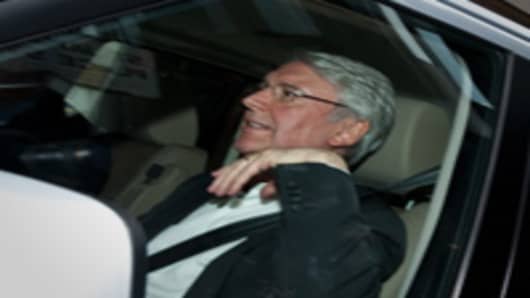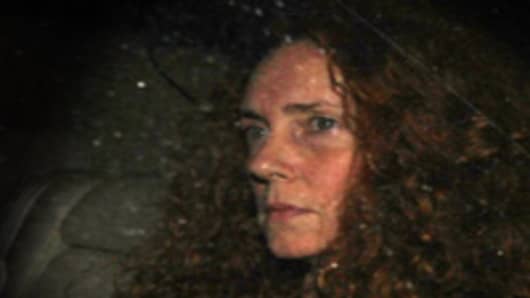In March 2003, a committee of the House of Commons summoned the executive in charge of Rupert Murdoch’s British newspapers to a hearing and put him on the spot about aggressive tabloid reporting tactics.
“Is it time to clean up your act?” demanded one member of Parliament. Les Hinton, the executive chairman of News International at the time, was indignant in his reply. “Clean up our act? Are you saying we’re dirty?”
With revelations that some within News International’s ranks were not only dirty but criminal, Mr. Hinton is coming under scrutiny for what he did and did not know when he ran the company from 1995 until 2007, the period when the most egregious known examples of voice mail hacking by News International employees took place.
Gerald Kaufman, a member of Parliament who questioned Mr. Hinton at that 2003 hearing, recalled their frosty exchange. “Clearly it was dirty,” he said. “It’s not just I. It’s everybody in British public life who’s saying it’s dirty.”
Even in a company noted for its loyalty, Mr. Hinton stands out both for his length of service — he has worked for Rupert Murdoch for more than 50 years — and for his wide experience within the News Corporation. He has worked in almost every part of the company and is chief executive of Dow Jones, publisher of The Wall Street Journal and the crown jewel of Mr. Murdoch’s American news media empire.
It can seem difficult to square Mr. Hinton’s 12-year run at News International — a company whose papers ran pictures of nude women and paid sources for information — with his leadership of Dow Jones and The Journal, a paper that until recently preferred sketches over photographs.
It is his tenure at News International that is now being re-examined. In statements to Parliament after the hacking came to light in 2006, Mr. Hinton said that it was limited to one rogue reporter. Mr. Hinton also said that he was never presented with any evidence that led him to believe the practice was widespread.
No one has linked Mr. Hinton, 67, to the eavesdropping. But as evidence grows showing that intercepting private voice mail messages was common practice at Murdoch publications in Britain, his remarks would indicate at best that he unwittingly allowed a corrupt journalistic culture to flourish underneath him.
“One explanation is connivance and alleged criminality,” said Claire Enders, a media analyst in Britain who has examined the potential fallout that the scandal could have on Mr. Murdoch’s businesses. “Another is a complete absence of engagement with the business — neither of which is expected of a senior officer of a major company.”
One of the editors Mr. Hinton hired for The News of the World, Neil Wallis, was arrested Thursday in connection with the hacking scandal. The two served together as members of Britain’s Press Complaints Commission, with Mr. Hinton as chairman of the committee that sets journalistic standards. In an episode that gained notoriety across Britain, Mr. Wallis published nude shots of a radio personality in 2001 when he was editor of The People. The blunder cost the tabloid a settlement of £250,000, about $400,000, and produced a landmark privacy ruling.
Politicians and the public were outraged, particularly because Mr. Wallis sat on the commission responsible for policing journalistic integrity. According to news media accounts at the time, Mr. Hinton told him in colorfully explicit terms that he was an “idiot” for buying the pictures. A little more than a year later, Mr. Wallis was hired as The News of the World’s deputy editor. Mr. Hinton and a Dow Jones spokeswoman declined to comment.
Few people who work for Mr. Murdoch are closer to him than Mr. Hinton. At age 15, he joined the first paper that Mr. Murdoch ever owned, The News of Adelaide, a tabloid in South Australia. Two years ago, Mr. Murdoch threw a party for Mr. Hinton celebrating his 50th year with News Corporation. Delivering the toasts were Mr. Murdoch; The New York Post’s editor, Col Allan; and Rebekah Brooks, the former News of the World editor at the center of the hacking fiasco.
Mr. Hinton, a skilled dancer, is known for being the center of attention at Christmas parties, and he has proved popular among his employees at The Wall Street Journal. They use the phrase “Les is more” to express their affection (although Mr. Hinton is always quick to correct the Americans who pronounce his name “less,” telling them it is pronounced “lez”). As Mr. Murdoch built a news media empire from London to Los Angeles, Mr. Hinton followed, running News Corporation businesses on two continents. He got his start in the United States as a reporter, then crossed to the business operations.
In 1991, Mr. Murdoch appointed him to run News America Publishing, the umbrella company for the News Corporation’s papers in the United States. In 1993 he was named head of Fox Television Stations, where he oversaw all of the local channels.
At the time, tensions between the News Corporation’s East and West Coast staffs ran high, and Mr. Hinton was seen by his Hollywood colleagues as part of a foreign Murdoch print-oriented culture. Many of them were none too pleased that the papers Mr. Hinton used to run relished writing about the private lives of movie stars.
Mr. Murdoch moved Mr. Hinton to London in 1995, putting him in charge of News International, with its stable of papers that were staid, like The Times of London, and salacious, like The Sun and The News of the World.
During the eight years that Mr. Hinton was chairman of the body that wrote the journalist’s code of conduct, known as the Editors’ Code of Practice Committee, part of his responsibility was to testify before Parliament or rush to the defense of his colleagues whenever outrage over the press’s aggressive and legally questionable tactics was pitched enough to warrant an inquiry.
He resisted even the most minor efforts to regulate practices that many media critics saw as unseemly. After a scandal at The Mirror in which writers were making stock-purchase recommendations for companies from which they expected to profit, Parliament wanted to require journalists to declare their interests in any shares they recommended. Mr. Hinton attacked the proposal as “completely unworkable.”
While British papers may operate with less rigid principles than American papers (Dow Jones, for example, has long prohibited journalists from owning shares in companies that they cover), they do carefully watch themselves in one area: libel.
“You need to know the evidence,” said Niri Shan, the head of media law at Taylor Wessing, a London law firm. “And I think that’s why some people find it hard to believe that the editor or other people in the organization didn’t know the provenance of the information. If I’m lawyering a piece, the first question I’m going to ask is ‘How did you get this?’ ”



